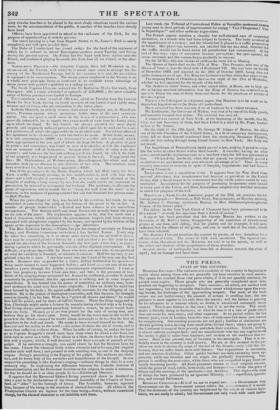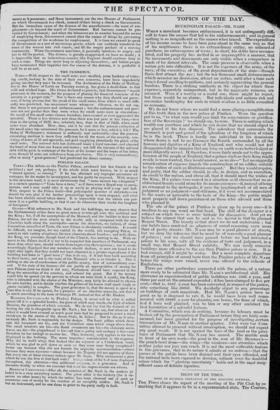THE PRESS.
STATE OF THE COUNTRY.
MORNING JOURNAL—The embarrassed condition of the country is beginning to excite alarm among those who are generally the least sensitive in such matters. The spasm has reached those vital parts where, if it he not speedily subdued, the patient must expire. Those people who are generally considered most inde- pendent are beginning to complain. Their murmurs, we admit, are neither loud nor imperious ; but they resemble that hollow sound which comes upon the even- ing breeze, the harbinger of the approaching tempest. The rents of the land- owner arc not forthcoming; the amount of arrears is swelling fast ; the tax- gatherer is more regular in his calls than the tenant ; and the banker is pressing fur his advances in a manner which, no doubt, is considered extremely incon- venient. This is one feature in the case ; but it is not the worst. The retail- dealer is literally doing no business ; or what he does is at a rate of profit which does not cover his rent, taxes, and other expenses. At no period within the last twenty years, even in London, have this class of tradesmen had more just reasons for complaining. Outstanding accounts are not paid; families of distinction are already quitting town, leaving their small debts behind them; others are going to the Continent to conceal their poverty and elude their creditors. Credit, indeed, is almost entirely extinguished ; and the manufacturer who has any capital worth the saving is glad to retire from business, and ruralize on the modicum that re- mains. Such is the present state of business in this metropolis. That it is in- finitely worse in the country is well known. We are at this moment in the po- sition we were in during the reign of the last of the Stuarts-e-only with this dil- ference, that we suffer much more real distress. Our expenditure is increasing and our revenue declining. Other public hurdens are daily becoming more op- pressive, while our incomes and our wages are gradually diminishing. Pau- perism is swelling the poor-rates, while those who are compelled to pay them are hourly becoming poorer. All fixed payments remain at their original amount, while the price of wool, cattle, farm-stock, and farm-produce—while the price of labour and the earnings of the mechanic—are declining,. This deplorable state of things has been produced by an ignorant Ministry, it h I a superficial, specula- tive, and corrupt Parliament. Motterno CHRONICLE--It is of no use to expect mote hoin Government than Government can do. Government cannot relieve the mateliacturers if it would. That the distresses of the country are heightened by the enacts of vicious legis- lation, we are ready to admit; but Government can only work with such mate;
meats as R possesses; and 'these instruments are the two Houses of Parliament, on which Government is a check, instead of their being a check on Government. But the immediate cause of the distress of the manufacturers—the want of em- ployment—is beyond the reach of Government. Bad harvests cannot be pre- vented by Government; and when the labourers are in number beyond the means of employing them, Government cannot alter the nature of things by preventing the competition of the workmen for employment. It is time we ceased to speak of Government as a sort of mysterious power, which can suddenly transform the crust of the weaver into rich viands, and fill the empty pockets of a starving community. When Government interferes, it generally interferes to empty, and not to till the pocket. The distress is greatly exaggerated, we have no doubt ; it is impossible that an industrious country like England should continue long in such a state. Things are never long in adjusting themselves; and before people have terminated their inquiries into the causes of the distress, it is probable it will be at an end.



















 Previous page
Previous page